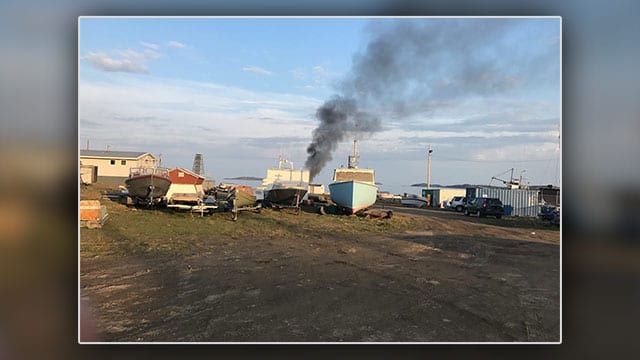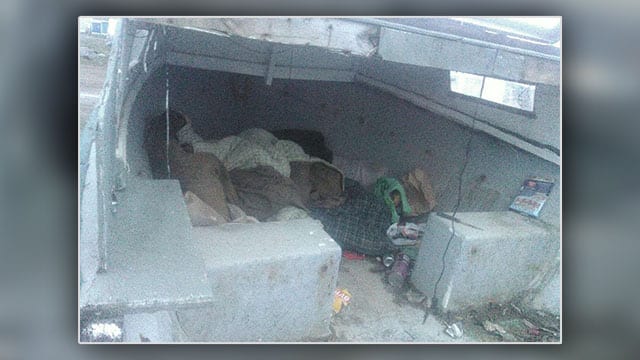
A beach shack used by homeless people caught fire July 14. (submitted photo)

A homeless family in Iqaluit lost everything they owned last weekend when the beach shack they were squatting in burned to the ground.
It was a huge blow for the struggling trio that moved to the Arctic capital from Pangnirtung about 10 months ago to escape what they said is escalating violence in the hamlet.
“We didn’t want him seeing that all the time,” father Jason Kakee said of his 13-year-old son.
“There was too much violent crime up there.”
The family, which includes mother Elizabeth, confirms what Pangnirtung officials announced in May that the community was awash in assaults, arson and suicide attempts.
Hamlet officials wrote to the territorial government for help and revealed shocking statistics: 12 young people tried to kill themselves, 55 people called the poison control centre, and a teenager fired a gun 11 times in the middle of a September night.
“Violent events in Pang have now become a daily occurrence,” said the letter from the municipal council. “Bootlegging is rampant and uncontrolled.
“If adequate urgency response services are not provided immediately, more and more people in Pangnirtung will be physically injured, emotionally traumatized and more lives will be lost.”
Things were bad enough for Kakee to pull up stakes and spend last winter in a wooden shack on the shore of Frobisher Bay without heat, water and plumbing.
“It was really, really cold,” he said in a video filmed this week by Qaumariaq Inuqtaqau and posted to the activist’s Facebook page Shame on Canada.
“We’ve been going to the food bank but sometimes we go hungry… We don’t have cooking supplies.”
Their escape to the capital landed them in the middle of another Nunavut crisis – a chronic lack of housing in the territory.
Kakee said they were walking back from the store in time to see flames shooting into the sky. What caused the fire is unknown.
“I was crying. We lost everything we had,” he said. “Our clothes… our bedding materials. Everything’s gone.”
About 100 homeless people live in rickety shacks, ripped tents and old boats along Iqaluit’s rocky shores, noted Inuqtaqau, because there aren’t enough homes, transitional spaces or room for couples and families in the city’s two shelters.
“I’ve been asking for help for these people for the last two-and-half years,” he said Friday.
Inuqtaqau said local businesses donated some clothing, groceries, a nylon tent and camping stove but he worries about the family with another winter looming.
“I’m desperate,” Kakee says on the video. “We need a place to live with my son.
“He has asthma; his lungs gets weak very fast sometimes.”
The use of camp stoves and fuel, among other problems, has sparked several fires in the makeshift homeless community, including one that killed a man.

“They could have actually saved some lives if they gave people a house,” said Inuqtaqau, who claims politicians and Inuit leaders are ignoring the emergency.
He says vulnerable people are at risk while government homes stand empty waiting to be awarded to out-of-town workers as part of their employment contracts.
“Southerners get housing and food subsidies while Inuks sleep on the beach,” Inuqtaqau said.
Kakee said the situation makes him sad.
“I was feeling really down because I didn’t want him to live like this,” he said of his son.
“We need a house. I want him to feel free and have friends around him.”
If the family makes a home in Iqaluit remains to be seen, but Mayor Madeleine Redfern says a multi-million-dollar expansion planned for the men’s shelter should ease some of the perilous conditions.
“It’s an issue that, as mayor, I have brought to the attention of both the governments of Nunavut and the federal government,” she said in a telephone interview Friday, noting she had visited the homeless family on the beach.
She said she was starting to hear about some flexibility in who gets housing owned by the territorial and federal governments, including employees relocating within Nunavut and not just those coming from outside the territory.
Redfern noted the city itself doesn’t build houses but makes land available.
To that end, she said work is underway to prepare a new subdivision for development next summer.
–with files by The Canadian Press









